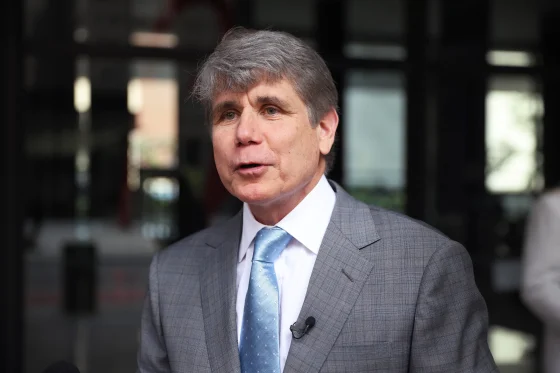On February 18, 2020, former Illinois Governor Rod Blagojevich received a presidential pardon from then-President Donald Trump, marking the end of his 14-year prison sentence for corruption charges. Blagojevich had already served nearly eight years behind bars before Trump commuted his sentence. The decision sparked a nationwide debate, with some applauding Trump for granting clemency and others criticizing the move as a dangerous precedent for political corruption.
Background of the Case
Rod Blagojevich, a Democrat, served as the 40th governor of Illinois from 2003 until his impeachment and removal from office in 2009. His downfall began in December 2008 when he was arrested on multiple corruption charges, the most notorious being his attempt to sell Barack Obama’s vacated U.S. Senate seat after Obama was elected President.
Blagojevich was accused of leveraging his political position for personal gain, including attempting to extort campaign donations in exchange for political favors. Prosecutors presented recorded phone conversations in which he allegedly said that Obama’s Senate seat was “a golden thing” and that he wouldn’t give it away for “nothing.”
In 2011, Blagojevich was convicted on 17 corruption-related counts, including wire fraud, attempted extortion, and conspiracy to solicit bribes. He was sentenced to 14 years in prison and began serving his sentence in March 2012.
Trump’s Decision to Commute the Sentence
Trump’s decision to commute Blagojevich’s sentence came after years of public debate about whether the former governor’s punishment was too harsh. Trump had hinted at the possibility of clemency as early as 2018, criticizing Blagojevich’s lengthy prison term. Trump argued that the former governor had been treated unfairly compared to other politicians convicted of corruption.
“I don’t know him very well, but he was on ‘Celebrity Apprentice,’” Trump said in a 2018 interview. “It was a foolish statement he made, but many people thought it was ridiculous, the sentence.”
When Trump officially commuted the sentence, he described Blagojevich as someone who had been given an excessive punishment for a non-violent crime. The move was met with mixed reactions. While Blagojevich’s family and supporters celebrated, legal experts and politicians across party lines voiced concerns about what it signaled for future corruption cases.
Blagojevich’s Response and Future Plans
Following his release, Blagojevich expressed gratitude to Trump, calling him “a great effing guy.” He maintained that he was unfairly targeted and framed by political adversaries. While he acknowledged that he made mistakes, he continued to insist that he had committed no crimes.
Since his release, Blagojevich has remained politically active. He has been vocal about prison reform, arguing that the justice system is overly harsh on some offenders. He has also hinted at returning to politics, though his felony conviction disqualifies him from holding public office in Illinois.
Blagojevich’s Ties to Trump
Blagojevich’s connection to Trump extends beyond the pardon. In 2010, before his incarceration, he appeared as a contestant on Trump’s reality TV show, “Celebrity Apprentice.” Although he was fired early in the season, the two maintained some level of mutual respect.
After his release, Blagojevich became a vocal Trump supporter, endorsing the former president’s policies and re-election efforts. He played a role in rallying Serbian-American support for Trump during the 2024 election, a move that aligned with his own Serbian and Croatian heritage.
Possible Diplomatic Appointment?
There were reports that Trump considered appointing Blagojevich as the United States ambassador to Serbia, a position that would leverage Blagojevich’s Serbian roots and connections. Though no official appointment materialized, Blagojevich has made multiple trips to Serbia, further fueling speculation about his diplomatic aspirations.
Public and Political Reactions
The decision to pardon Blagojevich was met with a mix of praise and criticism. Supporters argued that his sentence was disproportionately long compared to other corruption cases. They pointed out that many politicians convicted of similar crimes had received lighter sentences or avoided jail time altogether.
Critics, however, saw the pardon as a troubling sign of political favoritism. Many argued that the move undermined anti-corruption efforts and sent the message that high-profile politicians could escape justice if they had the right connections. Illinois lawmakers, including both Republicans and Democrats, expressed concerns about the precedent it set for future corruption cases.
Legal experts also noted that Trump’s decision fit a pattern of controversial pardons and commutations. Throughout his presidency, Trump granted clemency to several individuals convicted of white-collar crimes, including former campaign advisor Roger Stone and financier Michael Milken.
Conclusion
Rod Blagojevich’s pardon remains one of the most contentious clemency decisions of Trump’s presidency. While his release was welcomed by those who believed his sentence was excessive, it also reignited debates about political corruption and the fairness of the U.S. justice system.
As Blagojevich continues to explore political and diplomatic opportunities, his legacy remains a subject of intense discussion. Whether he will successfully reintegrate into public life or remain a symbol of political scandal is yet to be seen. Regardless, his story serves as a cautionary tale about the consequences of corruption and the complexities of justice in the political arena.
